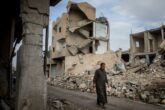June 04, 2018
The Pro-Assad Alliance Is Coming Apart
In a May 21 speech on U.S. strategy following President Donald Trump’s decision to withdraw from the Iran nuclear deal, Secretary of State Mike Pompeo struck a tough tone, promising to confront Iran’s Islamic Revolutionary Guard Corps (IRGC) and its multinational Shiite militia networks throughout the Middle East. But strong words have yet to be matched with action. For years, the United States has struggled to come up with a strategy for containing and eventually rolling back Iranian influence in Syria, the most hotly contested battlefield in the Middle East.
That may be about to change, thanks to an emerging fracture in the alliance backing Syrian President Bashar al-Assad. On one side of the divide is Iran, which seeks to consolidate its gains in Syria in order to apply military pressure on Israel. On the other side are the Assad regime, Hezbollah, and Russia, all of which fear a major conflict with Israel that could undermine what they have fought for in the Levant over the past decade. These divisions may finally provide Washington with the opportunity it has been seeking to check Tehran’s ambitions in Syria.
COMING APART
Assad’s position today is as strong as it has been since 2012, when Syria’s armed opposition first started gaining momentum. Over the past two years, the regime and its allies have made significant territorial gains, especially in the strategic areas in and around the capital of Damascus and in the last pocket of rebel rule in Homs Province. Assad’s opponents lack either the will or the capability to stop him from slowly winning the war.
Read the Full Article at Foreign Affairs
More from CNAS
-
Our Man in Damascus? Sanctions and Governance in Post-Assad Syria
The complexity of the legal and policy issues presented by the sanctions thicket surrounding Syria—and the disparate authorities responsible for various parts of it—will requi...
By Alex Zerden
-
Cryptocurrency in the War Zone: A Closer Look at Recent Events in Syria
Syria’s political fate remains in flux, both internally and in terms of its relations with key regional powers....
By Eitan Danon
-
Syria: What Happened and What Comes Next
After more than a decade of civil war involving major interventions from foreign powers, over the past week a rebel alliance incredibly rapidly gained control of city after ci...
By Richard Fontaine
-
Washington Needs a New Syria Policy Right Now
It is well past time for Washington to demonstrate leadership, advance its global and regional interests, and support the freedom and future of the Syrian people....
By Jonathan Lord




